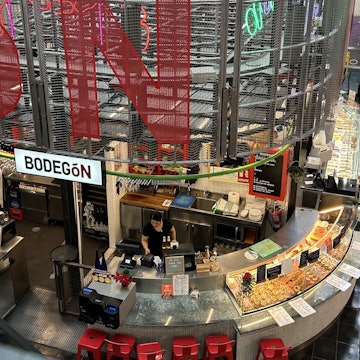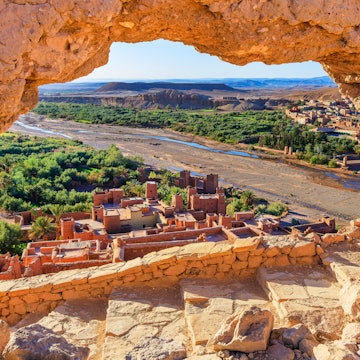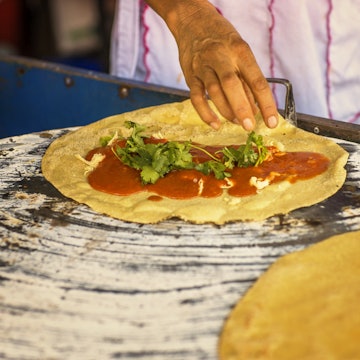

Playa de los Lances, backed by Tarifa town. Grisha Bruev / Shutterstock
Sink your feet into unspoilt powder-white sands, then grab your kitesurfing kit and hit the Atlantic waves. Welcome to one of Spain’s favourite summer playgrounds, the wild, beautiful Costa de la Luz. This natural, undeveloped coastline sprinkled with glorious blonde beaches and attractive, authentically Andalucian towns stretches northwest from activity-mad Tarifa, on the southernmost tip of Spain, to the Spain–Portugal border.
Some of its finest sands lie strewn along Cádiz province’s coast – and yet this dreamy patch of Andalucía remains little afflicted by mass tourism.
Tarifa town
Poised with laid-back style at the meeting of the Mediterranean and the Atlantic, Tarifa is an Andalucian town with its own special twist. Its famously windswept white-sand coastline pulls in kitesurfers, windsurfers, SUP-ers and beach-lovers from all over the globe. The winding old-town alleys feel like a taster for Morocco, which looms moodily 14km south across the Atlantic. The result is a decidedly easy-going town with a unique, fun-loving identity and a distinctive, surfer vibe. No surprise then, that outdoor activities of all kinds flourish on its doorstep.
A low-rise whitewashed tangle of narrow Islamic-era streets, Tarifa’s ancient core simmers with history and North African influence. Beyond the Mudéjar (style of architecture strongly influenced by Moorish taste) Puerta de Jerez, make your way to the historic 10th-century Castillo de Guzmán. It was here in 1294 that Reconquista hero Guzmán El Bueno notoriously tossed down his own dagger to Merenid attackers from Morocco, to indicate that he would rather they killed his hostage son than he surrender his castle.
A short wander east opens up striking Morocco panoramas from the Miramar lookout. Just north, in the heart of old Tarifa, you’ll come to the 16th-century Iglesia de San Mateo. Stroll down Calle Batalla del Salado, stretching northwest from the old town, for surf boutiques and kite/windsurfing schools.
Tapas and tintos
Tarifa dining is all about mixing up Spanish and international cuisines with strong organic, vegetarian and vegan tendencies. Moroccan-flavoured, Italian-run Café Azul whips up some of Andalucía’s most fantastic breakfasts: the fruit-and-yoghurt-stuffed crepes and fruit salads sprinkled with coconut could win beauty prizes. Seek out La Oca da Sergio in the old town for authentic Italian thin-crust pizzas and homemade pastas, or savour subtly creative tapas at always busy El Francés. Veggie-tastic food spots include Chilimosa (falafel wraps, mezze platters) and Tarifa Eco Center (pastas, salads, wholewheat pizzas).
With its carefree international crowd, Tarifa has some fabulously fun nightspots, including La Ruina, an old town ruin reincarnated as late-night club. For cocktails, sunset tunes and tinto de verano (red wine with local lemonade), make your way to popular lounge bar Tumbao on Playa de Valdevaqueros.

The beaches
Beyond its tip-of-Spain magic, Tarifa’s lure lies in the exquisite, action-packed, sugar-white beaches that sprawl hazily into the distance northwest from town. First comes beautiful 7km-long Playa de los Lances, then kitesurfing hotspot Playa de Valdevaqueros. About 10km northwest of Tarifa you’ll hit Punta Paloma beach with its spectacular sand dune and natural mud baths. The only downside? The unpredictable Atlantic wind rises and falls from one moment to the next – but you can always find refuge in a chiringuito (beach bar).
At the height of summer, in July and August, Tarifa’s beaches buzz with a mix of beach-lovers (many of them Spanish), international kitesurfers and windsurfers, and a few roaming mojito makers. Swing by in September if you prefer your beach time hot but a tad more peaceful.
Activities
Kitesurfing and windsurfing
Wave-riding is Tarifa’s heartbeat, and you’ll be spoilt for choice by the town’s 30-plus multilingual kitesurfing and windsurfing schools. Just remember that those choppy waves and legendary winds aren’t always beginner-friendly. Those in the know recommend May, June and September, when crowds are down and conditions are (relatively) calmer. If you’re already a pro, most schools hire out equipment for €70-90 per day.
Get cracking on kitesurfing at world-champion-led Gisela Pulido Pro Center with six-hour group introductory ‘baptisms’ (€140) or nine-hour ‘complete’ courses (€199). Respected ION Club does windsurfing and kitesurfing sessions for all levels, along with SUP.

Horse riding
Saddling up in Tarifa means hours-long horseback rides along silky white sands, over pine-flanked dunes and into rugged sun-bleached hills dotted with towering wind turbines. Horses here are usually fine Andalucian thoroughbreds: majestic, intelligent and sure-footed. Highly recommended, multilingual Aventura Ecuestre organises everything from one-hour beach rides (€30) to half-day excursions into the nearby Parque Natural Los Alcornocales (€80).
Whale-watching
The 14km-wide Strait of Gibraltar off Tarifa is one of Europe’s prime locations for spotting whales and dolphins. Striped and bottlenose dolphins, long-finned pilot whales, orcas, and sperm whales lurk at the confluence of the Mediterranean and the Atlantic. From April to October, sightings are practically guaranteed. If you’re lucky, you might even peek endangered fin whales and common dolphins.
Most whale-watching expeditions start from Tarifa, though a few also go from Gibraltar. On the scene since 1998, not-for-profit research-focused FIRMM runs environmentally conscious two- to three-hour tours with experienced marine biologists (€30). The best months for sperm whales are April to August. For orcas, try July and August.
Yoga
Tarifa’s laid-back scene blends perfectly with the yogi lifestyle, and there are plenty of opportunities to sun-salute your way into the day. A great place to start is Tarifa Eco Center, where yoga classes (€10) come in a wide range of styles and levels. Pilates, Qigong and natural therapies are also offered.

Walking
Tarifa’s wind-lashed coast makes for gorgeous walks. The 1.5km Sendero de los Lances boardwalk heads northwest from town through low, protected dunes backing Playa de los Lances. Further afield, a dramatic 7km beach walk leads from tiny Bolonia (off the N340 15km northwest of Tarifa) back to Punta Paloma; don’t miss exploring some of Andalucía’s most impressive Roman ruins at Bolonia’s Baelo Claudia first.
More adventurous souls can tackle the long-distance GR7 trail, which tracks northeast from Tarifa and on across Andalucía for over 700km. It eventually ends up in Andorra – no pressure to walk the whole thing!
Where to stay
Hostal África Outstanding-value old-town hostal (budget hotel) tucked into a colourfully revamped 19th-century townhouse.
Riad A 17th-century home turned sultry riad-style boutique hotel, with a hammam and a rooftop lounge.
Posada La Sacristía Boutique rooms spread across a 17th-century house in old-town Tarifa.
Hotel Dos Mares This Morocco-inspired pick fronts a perfect patch of beach 5km northwest of Tarifa.
https://shop.lonelyplanet.com/products/andalucia-travel-guide-8
















